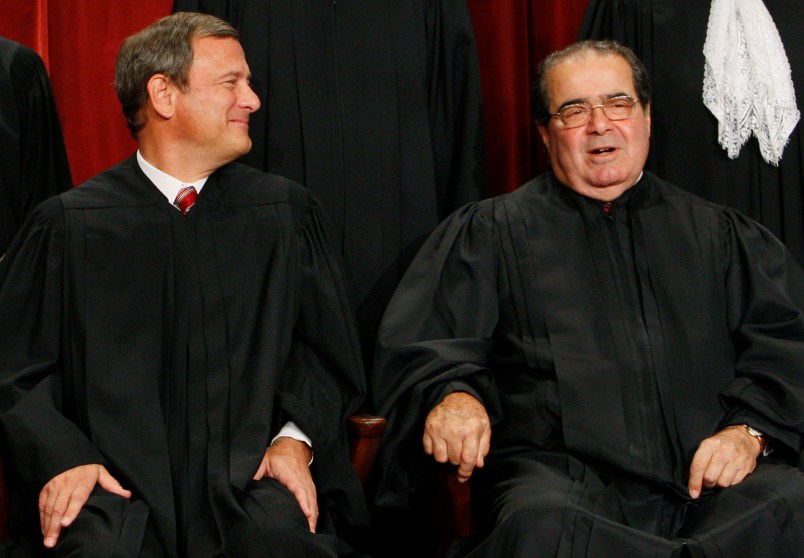Two split appeals court rulings on an expansive challenge to Obamacare subsidies in 36 states may end up giving Supreme Court justices another opportunity to gut the law.
On Tuesday, two Republican-appointed judges on the D.C. Circuit Court of Appeals ruled that the text of the Affordable Care Act permits only state-run exchanges — not the federal exchange — to provide subsidies. The ruling, if it stands, would cripple Obamacare as the federal subsidies are essential to the law. The Obama administration quickly said it would ask for a full bench ruling, which could plausibly reverse the decision.
Also on Tuesday, a panel of three Democratic-appointed judges on the 4th Circuit Court of Appeals ruled the opposite, declaring unanimously that the law clearly lets the federal exchange, built on behalf of states that declined to build their own insurance marketplaces, provide subsidies.
Tom Goldstein, a lawyer who has argued cases before the Supreme Court, wrote that “the fact that another court of appeals upheld the same rule on the same day shows that the legal issue is very thorny and will very likely be ultimately resolved by the Supreme Court.”
The Obama administration’s en banc appeal means the full active D.C. Circuit bench, plus the senior judges who originally heard the case, would rehear the case and revote on it. For that to happen, a majority of active judges have to agree to hear it en banc. If they do, the partisan odds favor Obamacare: 8 of the judges would be Democratic appointees; 5 of them would be Republican appointees. Legal experts say an en banc hearing that’s unlikely to happen until the fall or early winter.
“I think it’s very likely [to be reversed],” said Nicholas Bagley, a professor at the University of Michigan Law School. “The mode of statutory construction that Judge Thomas Griffith used is one that generally appeals to conservatives more than it does to political liberals. So I think it’s unlikely that a Democratic-appointed judge will rule against the government here.”
Senate Majority Leader Harry Reid (D-NV), who helped President Obama add three judges to the D.C. Circuit by changing the Senate rules in November, predicted the full bench would reverse the panel’s ruling. “It seems clear to me that that decision is going to be overturned,” he told reporters.
Meanwhile, the Obamacare challengers at the 4th Circuit would have a very hard time winning en banc. The full bench consists of 9 Democratic-appointed judges and 4 Republican-appointed judges. So it’s plausible they won’t seek an en banc ruling. Instead it may be in their interest to appeal directly to the Supreme Court, where legal experts say their chances of victory would be greater.
For the Supreme Court to accept a case, four justices have to agree to it. But whether the Supreme Court takes any given case for review depends on several hard-to-predict factors. A split among the circuit courts on the validity of a major federal law enhances the chances of the Supreme Court getting involved, legal experts say. But it’s possible that if the D.C. Circuit ruling is reversed and the 4th Circuit ruling stands, there will be no split and the Supreme Court may be likelier to turn it down and let the rulings upholding the law stand.
“If the circuits don’t split — if the D.C. Circuit does reverse it en banc, the absence of a circuit split will diminish the likelihood that the Supreme Court will hear the case. But even in the absence of a circuit split the Court could hear it,” Bagley said.
The White House would prefer not to re-litigate the health care law at the Supreme Court, where five Republican-appointed justices have a demonstrated hostility toward the law. In 2012, four of them voted to wipe out Obamacare in its entirety; the swing vote, Chief Justice John Roberts, made the Medicaid expansion optional for states. Last month, the five justices axed a requirement under the law that employers cover emergency contraceptives for women in their insurance plans at no extra cost.
But Goldstein suggested the odds remain daunting for conservatives, who are seeking to destroy an essential component of a massive new law on the basis of a dubious technicality. Roberts, for all his misgivings, proved unwilling to deal a fatal blow to Obamacare in 2012. And now that millions of Americans are benefiting from the law’s federal subsidies, stripping them away is a difficult proposition.
Goldstein predicted “the administration probably will come out ahead in the end.”







Seriously? IANAL, but isn’t the legislative intent pretty clear from the law and the rationale? Careless language should not be the tool by which political battles are won.
Except for further enrichment of people who profit from The GOP Bubble, where is the upside? Spite? How on Earth does that help the GOP politically?
Many Red Staters finally have health insurance–and more to the point: many of their struggling young sons and daughters (and grand kids) over 26 have health insurance. They know what’s what here, despite their bumper stickers and viewing habits.
The GOP higher ups are either stupid or they are just flying by the seat of their pants, hoping a defeat of O’Care helps them, somehow, or maybe that they can blame its demise on PBO.
But there is no way this helps them long term.
Well, this is their M.O. The SCOTUS two step.
What saddens me most about the ruling against Obamacare is that it came too late to help the poor souls that Hilary murdered in Benghazi.
The biggest victim here is the legitimacy of the court system and the solidity of the rule of law.
There’s always some degree of politics, even in the judiciary, but it appears that “conservatives” have decided to throw out norms and precedent and just rule based on ideology under a exceedingly thin veneer of legal justification.